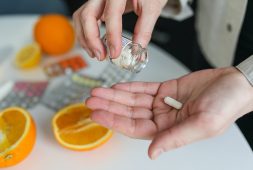New Study Finds That Adults With No Stroke Or Heart Attack History Shouldn’t Start On Low-Dose Aspirin

A recent study published on July 26 in JAMA Network Open challenges the traditional notion that daily low-dose aspirin provides significant benefits in reducing the risk of stroke in healthy older adults. Moreover, it even upped the risk of brain bleeding due to falls or other head injuries that may occur from a stroke.
Senior author John McNeil, PhD, a Professor of Chronic Disease and Aging at Monash University in Melbourne, Australia said, “Our study showed that in older people free of previous cardiovascular or cerebrovascular disease, the combination of bleeding in the brain and on the surface of the brain outweighed any potential benefit in reducing ischemic stroke.”
“In fact, our study could not convincingly demonstrate any reduction in ischemic stroke,” says Dr. McNeil.
An ischemic stroke is when a vessel that supplies blood to the brain gets obstructed. According to the American Stroke Association, this type of stroke accounts for about 7 out of 8 strokes.
Questioning the Cardiovascular Benefits of Daily Aspirin Use
While it’s been known that aspirin may hardly cause intracerebral hemorrhage – bleeding into the brain – this event is also considered rare and substantially outweighed by the benefits of aspirin use, such as the reduction of ischemic stroke, explains Dr. McNeil.
To better understand and figure out whether long-term, daily low-dose aspirin treatment affects the incidence of stroke or intracerebral bleeding in primary prevention settings, the study researchers used data from theAspirin in Reducing Events in the Elderly (ASPREE) study.
In this particular case, primary prevention meant that patients were taking aspirin as a preventive for the first occurrence of heart attack, stroke, or another cardiovascular event.
As for secondary prevention of cardiovascular disease to prevent recurrent events in individuals who have already suffered from a heart attack, stroke, or coronary revascularization procedure, such procedures are putting in a stent or having bypass surgery.
The trial, which was composed of around 19,000 initially healthy older adults – mostly over the age of 70 – who joined the study between the years 2010 and 2014, were from Australia and the United States. The average age of the participants was 74, while 56 percent were female. 91 percent of the participants were white, while 4.7 percent were Black, 2.6 percent were Hispanic, and 0.9 were Asian.
The participants did not have known cardiovascular disease when they began the study, and were randomly assigned to take a 100 milligrams daily aspirin or a placebo tablet for an average of five years.
Taking a Daily Low-Dose Aspirin Did Not Reduce Stroke Risk
Investigators observed no statistically significant difference in the incidence of ischemic stroke between the aspirin and placebo groups, with 4.6 percent of individuals in the aspirin group experiencing a stroke compared to 4.7 percent in the placebo group.
While the occurrence of brain bleeds was relatively low, happening in 59 individuals taking aspirin and 41 individuals taking the placebo, the disparity was not deemed statistically significant given the study’s size. However, the authors highlighted that the incidence of bleeding events was 38 percent higher in those who were administered aspirin.
The authors emphasized that the risk of brain bleeding outweighed any potential benefits in reducing strokes. This encompassed both bleeds into the brain and bleeds on the brain surface, often associated with head trauma.
Dr. McNeill shares that the take-home message from this is that, “For older individuals (aged 70 and above) without a previous heart attack or stroke, there are an increasing number of studies suggesting that low-dose aspirin provides no overall benefit and an increasing number of previously unrecognized risks.”
A secondary analysis from the same study, published in the Annals of Internal Medicine, added another dimension to the risks associated with daily aspirin use. It suggested an increased risk of anemia due to “hidden” blood loss, presenting an additional concern for those considering daily aspirin regimens.
Continued Recommendation of Low-Dose Aspirin for Individuals with a History of Heart Attack or Stroke
Jason Mathew, DO, a vascular neurologist at Stony Brook Cerebrovascular and Comprehensive Stroke Centerin New York, who was not involved in the research, said this study builds on what is now known regarding low-dose aspirin and primary prevention of stroke.
“This study uses a large group of elderly people — who we believe to be more at risk of a stroke — to show that the benefits didn’t outweigh the risk in this population,” he says.
For older individuals who have experienced in prior heart attack or stroke (secondary prevention), it is believed that the benefits of aspirin, such as a decreased likelihood of recurring events, outweigh the potential concern of hemorrhage.
Dr. McNeal adds, “Older people taking aspirin should not stop doing so without consulting with their primary care doctor.”
Dr. Mathew agrees, saying “Once you do have an event — meaning you’ve had a stroke or TIA (transient ischemic attack, also called a ministroke) — taking a low-dose daily aspirin is absolutely indicated.”
Current Guidelines on Aspirin Usage for Preventing Heart Disease in Primary Prevention
In light of these findings, it’s noteworthy that the U.S. Preventive Services Task Force (USPSTF) updated its guidelines in 2022, recommending against initiating low-dose aspirin for the primary prevention of cardiovascular disease in individuals aged 60 or older. This aligns with the stance of other national organizations, including the American Heart Association (AHA), and is based on accumulating evidence indicating that the risk of fatal internal bleeding associated with regular aspirin use may outweigh the preventative benefits.
The revision was informed by recent evidence suggesting that the potential risk of fatal internal bleeding associated with regular aspirin use may outweigh its preventive benefits.
It’s important to note that these recommendations exclusively pertain to the primary prevention group and do not extend to individuals who already have established cardiovascular disease, as clarified in the statement.
Should You Discuss Your Daily Aspirin Use With Your Doctor?
Dr. Mathew says, “If your doctor has told you to take a daily low-dose aspirin, do not stop taking it.” He adds that if you’re not sure you should be taking low-dose aspirin, or if you’re taking it for primary or secondary prevention, be sure to discuss it with your doctor.
“One challenge is that aspirin is sold over-the-counter. There are times when I ask patients to list all the medications they are taking, and they leave aspirin off the list because it’s not a prescription drug,” says Dr. Mathew.
It’s important that you tell your doctor all the medications and supplements you are taking, including aspirin, he adds.
Yearly Medical Check-Ups Recommended for Older Adults
According to Mayo Clinic, while aspirin can help prevent future heart attacks and strokes when used in secondary prevention, it also comes with risks, like GI bleeding or an allergic reaction.
It’s also a good idea to see your doctor regularly, says Dr. Mathew. In addition, Mayo Clinic suggests older patients see their doctor at least once a year.
Dr. Mathew says, “Many people assume that they would fall into the ‘generally healthy’ group that was included in this study, but that may not be the case, especially if you haven’t seen your doctor in a few years. Make sure you are checking in with your doctor to make sure that your risk factors are being appropriately managed.”



